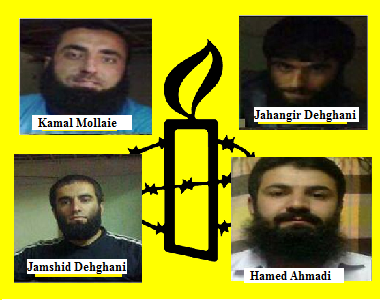
HRANA News Agency – Hunger striking Sunni men from Iran’s Kurdish minority are in grave danger as their health deteriorates after 64 days on hunger strike. They have been on hunger strike in protest at their death sentences and the conditions in which they are held.
Jamshid Dehghani, his younger brother Jahangir Dehghani, Hamed Ahmadi and Kamal Molayee, who have been on a “wet” hunger strike (taking water but not food) since 4 November, are now in critical condition. All four men have repeatedly lost consciousness since 30 December. Because of this, they have been given intravenous fluids in the clinic in Ghezel Hesar Prison in Karaj, north-west Tehran. They have apparently refused to receive the intravenous fluids each time they have regained consciousness. Continue reading “Amnesty International: Iranian hunger strikers’ health failing”

HRANA News Agency – Hamed Ahmadi, Kamal Molayi, Jamshid Dehghani, Jahangir Dehghani, Sedigh Mohammadi and Seyed Hadi Hosseini are in hunger strike since 26 days ago in Ghezelhesar prison.
These Sunni prisoners of conscientious who are sentenced to death requested for help from human rights organizations and independent media through publishing a letter that they have written in the 21st day of their hunger strike.
You are about to read the complete letter: Continue reading “Sunni prisoners seeking for international help”

HRANA News Agency – Islamic Republic of Iran delegation to the United Nations on Wednesday (18th October) after the release of the latest report of Ahmed Shaheed, Special Rapporteur of the UN Human Rights Council on the human rights situation in Iran, has sent a document to the UN High Commissioner for Human Rights Council and reflected its response to the report in some cases including the freedom of expression and association and rights of minorities in Iran.
Undoubtedly the publishers of this document in the office of the Islamic Republic of Iran in Geneva know the facts better than anyone else and are more aware of the truth and real situation in Iran. It is evident that their job is to deliver such declarations and that is what they are getting paid for. But to just remind them once more that this way of earning money is not a very moral one, I want to draw the attention of these gentlemen to these simple points about they have mentioned in their released document: Continue reading “Iranian delegation’s reaction to Ahmad Shaheed’s recent report”

HRANA News Agency – Since October 11, 2012 until October 10, 2013 there have been 537 prisoners hanged in Iran which is 9% more than the last year. The death penalties are issued and enforced in a case that the prisoners do not have access to just trial process in Iran.
In this report, we will take a look at the annual execution rate and compare it with the last year. Meanwhile we will try to predict the execution rate of the next year on the basis of statistics since. Continue reading “October to October, a report on the executions rate in Iran”

HRANA News Agency – Ahmad Tamooyi, the prisoner of central prison of Uremia, has unmasked some physical and mental tortures, which he has experienced during past 6 years in jail in a letter to Ahmed Shaheed.
Mr. Tamooyi, is now kept in the general ward (the ward of murderers), after the last false case which was made by officials for him.
You are about to read the full letter of protest that is being published by HRANA: Continue reading “Ahmad Tamooyi’s letter to Ahmed Shaheed from Uremia prison”

The Sydney Feminists have teamed up with United Nations Youth Australia to bring you a screening of “Don’t Bury My Heart”, a powerful documentary about child executions in Iran. Created by director/producer Saba Vasefi, the film has been screened for the BBC, Amnesty International in London, as well as the Copenhagen International Film Festival, the Iran Human Rights forum at the University of Oslo and the UN in Geneva. Continue reading “Youth in Peril – Film Screening of “Don’t Bury My Heart” and Panel Discussion”
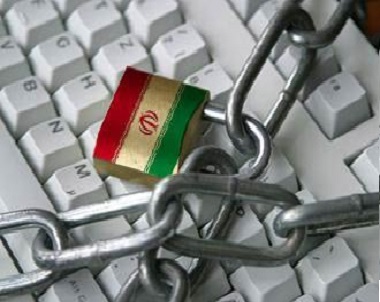
Discussion of Internet censorship usually focuses on China and its “Great Firewall.” But the Chinese Communist Party isn’t the only regime that censors its Internet. Iran does too.
Little is known about Iran’s censorship system because Iranian citizens who probe the network from inside the country risk reprisals from the government. But earlier this year, two anonymous Iranians teamed up with Alex Halderman, a computer science professor at the University of Michigan, to conduct one of the first systematic studies of Iranian Internet censorship to be published outside Iran. Halderman presented his findings at a Tuesday talk at the Usenix Security conference in Washington, D.C. Continue reading “Here’s how Iran censors the Internet”
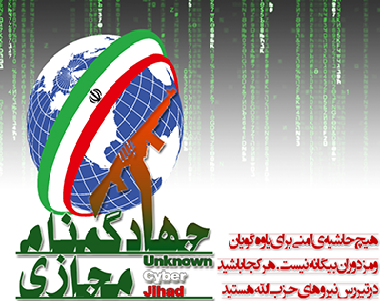
The BBC’s Persian service reported that at least five opposition websites–Khodnevis, Saham News, The Communist Party of Iran, the Voice of the Green Wave, and Defender of Human Rights–had been briefly hacked. The conservative news website Emad News also reported that RASA Iran Green Media, Rowzane, Centre for Supporters of Human Rights, and Ostanban had been hacked, and showed before-and-after pictures of the websites. Continue reading “Iranian authorities target Internet, media before elections”
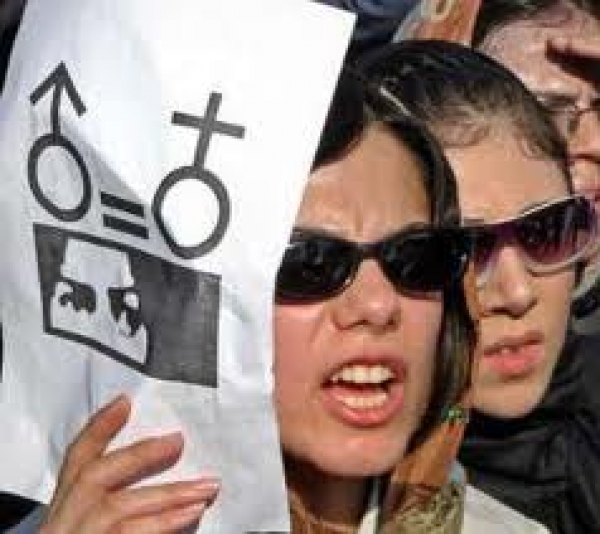
Establishment of Islamic regime amounted to controlling women’s sexuality and sexual rights directly. At its first years of existence, regulations were made to restrain unveiled women from working in governmental offices. Additionally deprived them from presenting in public sphere until 1982 when the state stabilized legal violence against women by criminalizing unveiled appearance in public punishable to fine or prison. Prostitutes were killed harshly and brothels were put on fire in order of Imam Khomeini. As the documents show state’s policy was aimed to reinforce Islamic morality (in men’s favor) thought out the society.
In short, I can conclude that the state and men in the families have power on issues related to women’s sexuality; obtaining divorce, extra marital relationships, sexual behavior, and dress code.On the other hand, men’s sexuality is not being considered as an important issue to be restrained, yet as a liberate power to be used for controlling women’s sexuality in order to safeguard the social security. Sharia as a political ground became a legitimate device to regressive social and legal rules such as gender discrimination in civil and penal codes, gender segregation, and moral police introduced under social security project initiated by Ahmadinejad’s government.
Continue reading “Women, Law and Sexuality in Iran”
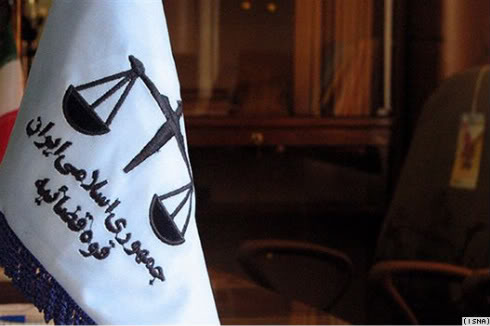
From March 2012 to March 2013, the appeal courts in Iran issued 77 verdicts against the following individuals and sentenced them accordingly.
Continue reading “Seventy Seven guilty verdicts issued by appeals courts”













